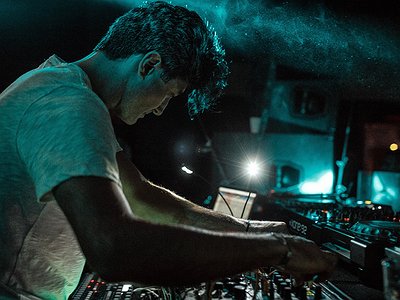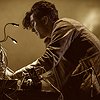Part 2
Could you describe your creative process on the basis of a piece or album that's particularly dear to you, please? Where did the ideas come from, how were they transformed in your mind, what did you start with and how do you refine these beginnings into the finished work of art?
One of my first records under my old alias Son Of Rose called ‘Divisions In Parallel’ is still one of my most memorable. It was made using only the strings of a grand piano. I used three ebows (a battery powered magnet) to resonate the strings. I stuck a door stop in the damper pedal and used a couple of microphones to both record and electronically process the sound in real time. A very talented friend of mine, Zachary James Watkins, turned me onto the technique, but my main reference was the experiments of composer Alvin Lucier and the tonal work of Oren Ambarchi. The record came together very quickly, which for me is a really good sign, because if I over work an idea it often kills the original intent. Ninety percent of my work is done in real-time, I try not to spend allot of time mousing around and endless tweaking. Capturing the moment is key for me. I went on to perform this piece live several times, but I’m always moving in order to not repeat myself and turn into a one trick pony.
There are many descriptions of the ideal state of mind for being creative. What is it like for you? What supports this ideal state of mind and what are distractions? Are there strategies to enter into this state more easily?
It’s all about putting in the hours of solid work and just making things at all times. I don’t wait for inspiration or a creative moment. The ideal state of mind is when you are no longer using your mind.
How is playing live and writing music in the studio connected? What do you achieve and draw from each experience personally? How do you see the relationship between improvisation and composition in this regard?
I make records the same way that I play live. The only difference is that in the studio I spend time on a bit of mix and editing. I’m coming from a manual music and performance background, and this technique allows me to find things that I perhaps wasn’t really looking for. Improvisation reveals the heart, and composition reveals the mind of the person making the music.
How do you see the relationship between the 'sound' aspects of music and the 'composition' aspects? How do you work with sound and timbre to meet certain production ideas and in which way can certain sounds already take on compositional qualities?
I start my work with an acute act of listening. I treat sound as malleable physical object, an element with structural integrity. I like to create sonic environments that I go inside, when I’m there I decide whether I want to float or dance. For me it’s often coming from only one sound, a horizon that I can surround with whatever my imagination and creative compass desires at that time.
Our sense of hearing shares intriguing connections to other senses. From your experience, what are some of the most inspiring overlaps between different senses - and what do they tell us about the way our senses work? What happens to sound at its outermost borders?
I was commissioned to create a piece of music inside an unfinished nuclear cooling tower in Washington State. The overwhelming size of this structure, which was shaped like a speaker cone, had the most unbelievable echo. I spent about 8 hours in this thing recording and that night I had my first and last sound dream. Everything that was happening in my dream had the exact same acoustics and echo. I woke up with a huge smile.
Art can be a purpose in its own right, but it can also directly feed back into everyday life, take on a social and political role and lead to more engagement. Can you describe your approach to art and being an artist?
What I do is a part of my everyday life, I eat and breathe my work. I’m not sure I could have it any other way. I think it takes a certain type of person to live to work as opposed to working to live. Being an art worker has always meant accepting a certain level of sacrifice at any given moment, weather it’s social life or monetary. Of course music and art is big, big business, and some people approach it like a business, for better or worse. I do not.
It is remarkable, in a way, that we have arrived in the 21st century with the basic concept of music still intact. Do you have a vision of music, an idea of what music could be beyond its current form?
I think there are allot of outstanding achievements from the likes of John Cage, Iannis Xenakis, the Futurists, Fluxus artists, Punk, Noise and Jazz and ancient ritual music that many people, including myself are still discovering. This doesn’t even take into account the music of nature and animals. My work at the moment is to accept all possibilities, methods and sounds and try to squeeze them into what we call music. Keep the vision as wide as possible and stay on the path of discovery without being kidnapped.






